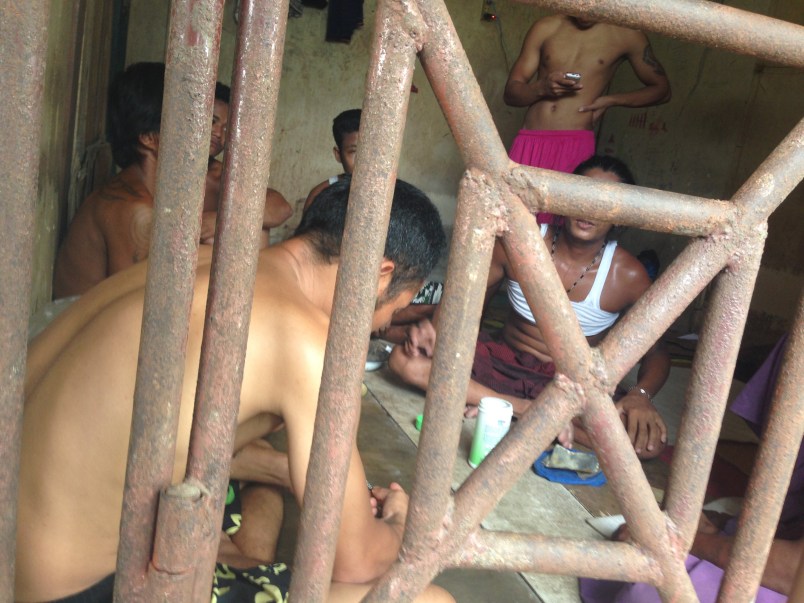BANGKOK (AP) — Thailand’s junta leader has vowed to take legal action against companies using forced labor, after an Associated Press investigation revealed that fish caught by enslaved migrant workers was being exported from Thai ports to global markets.
In comments published Friday by the English-language Bangkok Post newspaper, Prime Minister Prayuth Chan-ocha acknowledged he had seen this week’s AP article and said his government was stepping up efforts to combat the scourge and prosecute those responsible.
“If they still continue to exploit their fellow human beings, they should not be given any licenses to operate businesses in Thailand, and they must receive the punishment they deserve,” Prayuth said in a written response to questions the paper submitted.
The AP reported on Wednesday that men were held in a cage along with hundreds of people who are trapped on the remote Indonesian island village of Benjina, and the seafood they caught was tracked to Thai exporters who sell to global markets, including America.
The more than 40 men the AP interviewed on Benjina said they were brought to Indonesia from Thailand and put on trawlers with Thai captains who forced them to drink unclean water and work 20- to 22-hour shifts with no days off. Almost all of the men, who are from Myanmar, said they were kicked, whipped with toxic stingray tails or otherwise beaten if they complained or tried to rest. They were paid little or nothing.
The investigation prompted the U.S. government and major business leaders to renew their calls on the Thai government to crack down on slavery in its fishing fleets, and to punish people who force migrant workers to catch seafood that can end up in the United States. Thailand’s biggest seafood company, Thai Union Frozen Products, announced that it immediately cut ties with a supplier after determining it might be involved with forced labor and other abuses. Thai Union did not name the supplier.
The International Organization for Migration in Indonesia estimated 4,000 foreign fishermen are stranded on remote eastern islands in the archipelago after being abandoned by their boat captains following a government moratorium on foreign fishing that has docked vessels to crack down on illegal operators.
“It is reasonable to expect many are victims of trafficking, if not outright slavery,” said Steve Hamilton, deputy chief of mission for the group, who said it has been working with the government to repatriate trafficked fishermen.
Thailand, which has been under military rule since a May 22 army coup, was blacklisted by the U.S. State Department last year for failing to meet minimum standards in fighting human trafficking. The government says it is cleaning up the problem and has laid out a plan to address labor abuse, including new laws that mandate wages, sick leave and shifts of no more than 14 hours.
At least 1.6 million foreign migrant workers, most of them employed in the fishing industry, are now registered with the government and have the same labor protections as Thai workers, according to the Ministry of Foreign Affairs. The ministry says the industry will be more closely monitored, with surveillance systems scheduled to be installed on more than 7,700 fishing vessels by June.
On Thursday, the country’s junta-appointed lawmakers voted unanimously to create tougher penalties for violating the country’s anti-human trafficking law. Causing a person’s death through human trafficking could bring the death penalty, and those who cause severe injury face a maximum sentence of life imprisonment and a fine of 400,000 baht ($12,300).
The bill had been under debate for several weeks, and is part of the government’s efforts to show it is getting tough on the issue.
Phil Robertson, deputy director of Human Rights Watch’s Asia division, urged Thai authorities to tackle the scourge.
“The Thailand government has made repeated verbal commitments to get tough with traffickers but every time real follow-up has been lacking,” Robertson said in an email. “The question now is whether the revelations in AP’s article will finally be enough to push Thailand to take long overdue action against fishing vessels that are systematically using slave labor to catch the seafood ending up in America’s kitchens.”
The Post quoted Prayuth as thanking members of the media for shedding light on the issue. “I know that every one of you wants to do your job to the best of your ability to help the victims. I think we are on the same team,” he said.
But Prayuth and his government have delivered differing messages on the issue. Earlier this week, he urged journalists not to report on human trafficking without considering how the news would affect the country’s seafood industry and reputation abroad. He also sarcastically suggested that journalists who ignored him might be executed; State Department spokesman Jeff Rathke said from Washington that the U.S. was troubled by the comment.
On Thursday, Gen. Prawit Wongsuwan, Thailand’s deputy prime minister, denied there were any slaves working on Thai-flagged fishing boats, instead saying the problems occurred in Indonesia.
Indonesia, meanwhile, has vowed to crack down on those responsible within its territory. “We would like to assure you that we will take legal measures to address what happened in Benjina and other places,” said Indroyono Soesilo, coordinating minister of Maritime Affairs.
___
AP writer Niniek Karmini in Jakarta, Indonesia, contributed to this report.
Copyright 2015 The Associated Press. All rights reserved. This material may not be published, broadcast, rewritten or redistributed.






